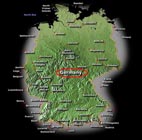Everyday reality reflected artistically at 2008 Prix Europa
 Berlin - TV and radio producers, directors and commissioning editors have begun flooding into Berlin for the 2008 Prix Europa festival, which heads off Saturday, with 31 countries and 213 nominated productions chasing trophies and 80,000 euros (108,000 dollars) in cash awards.
Berlin - TV and radio producers, directors and commissioning editors have begun flooding into Berlin for the 2008 Prix Europa festival, which heads off Saturday, with 31 countries and 213 nominated productions chasing trophies and 80,000 euros (108,000 dollars) in cash awards.
Susanne Hoffmann, the long-serving director of the continent's biggest tri-media event, says more than 1,000 people will participate, with many arriving from countries in the north and from Central and Eastern Europe.
It's not only a strong event for the established stations of the West, but also for countries like Georgia, Moldova, Ukraine, Belorussia and of course Russia, she says, noting that Poland, Romania, Bulgaria and the Czech Republic will also be flying their flags in Berlin.
"The best of TV is not only produced in the west of our continent, it's everywhere. The same goes for radio," she said in a mid-week interview with Deutsche Presse-Agentur dpa.
"We have many very strong entries, not all of which we've been able to include in the competition. But we can also say that too few entries are being produced for young audiences.
"This is something that is known, but up to now not many broadcasters react to that. Even younger producers don't tackle issues for young audiences," she complained.
The festival will be surrounded by several workshop and seminar "fringes."
From Eastern Europe, Hoffman says Belorussia alone has five productions at the Prix Europa.
Croatia is submitting TV and radio documentaries for the seven-day event, staged at Berlin's Haus des Rundfunks (House of Radio), opposite the international trade fair exhibition grounds.
A TV documentary, directed by Silvio Mirosnicenko and titled Love Song About Storks, has been entered by Bosnia.
It depicts the career of the famous Balkan Muslim rapper Edo Maajka, whose songs often reflect young people's rage at the socio- political situation in Bosnia, Croatia and Serbia.
From Ukraine, a TV current affairs production Bomb Under Chernobyl deals with the international corruption scandal at the Chernobyl nuclear power plant.
It seeks to show how big EU companies allegedly made "deals" with the Chernobyl plant.
Directed by Ludmila Rodina, it has, predictably perhaps, provoked a "sensitive" reaction from the European Commission and contractors in Chernobyl.
Hoffmann speaks of there being a trend towards more realism in radio and TV productions.
"It's not about the world wars or high literature but about entries, either fiction or documentary, dealing with everyday reality," she says.
Georgia and Ukraine had come through with interesting TV productions, she said.
"Again the focus is very much on everyday themes, everyday life. It's not about big politics but about normal life," she said.
Czech Television director Jiri Svodboda's The Wave is competing for a prize in the festival's fiction section.
Set against the background of the tsunami drama along the shores of the Indian Ocean in December 2004, it is the story of two lifelong friends who meet one another again after a lengthy period.
Then the giant tsunami engulfs them, sweeping one of them away. The other survives but his memory is affected, and from there on the story takes a strange twist, with the rescued man hiding for a spell behind the identity of his lost friend.
The TV documentary trilogy, '68 - Hope, Betrayal, produced for the 40th anniversary of the 1968 Prague Spring by Viktor Polesny, is also to be shown at the festival.
It deals with the August 1968 arrival of Soviet-led Warsaw Pact forces to snuff out any dreams of democracy and also with the tragic death of student Jan Pallach on Wenceslas Square.
CTV chief editor Ivan Hubac is expected in Berlin for the film's presentation.
Top British and French radio and TV outlets also feature heavily at the media jamboree.
British director Antony Thomas' documentary The Qur'an takes the viewer into the heart of the Muslim world through the personal lives of people living according to their understanding of the Koran.
The range of witnesses and experiences is extraordinary - from ayatollahs and grand imams to simple farmers; from women in positions of power to women living in veiled seclusion; from those who speak of the Koran's uncompromising message of peace and tolerance to those who find justification in the text for violent conflict and suicide bombing.
The film's promoters claim that all speak frankly about their relationship with the book which "governs their lives."
A special Prix Europa Berlin summit is planned for October 24, when controllers of radio stations will gather to discuss the future of cultural radio in Europe.
Behind closed doors they will discuss target audiences, marketing strategies and programming, as well as the national and regional relevance of cultural radio in Europe
Raina Konstaninova, the Bulgarian-born director of radio at the European Broadcasting Union (EBU), is to open the conference.
A famous promoter of radio channels, she claims that almost 95 million people in Europe still listen to the radio "up to three hours a day."
Far from dying, radio audiences in Europe are increasing, she insists, "with statistics proving this." Hoffmann agrees.
"Berlin," she says, "is a city of radio stations."
"No other city in Germany or for that matter any other country in Europe has so many radio stations.
"There is big competition here, and radio is listened to on a high level. The advantage is you can listen to it when you are doing the ironing, or when you are sitting in your car. With TV it's different," she said. (dpa)